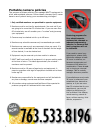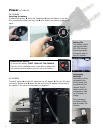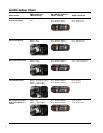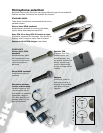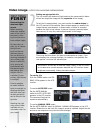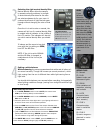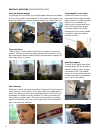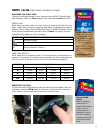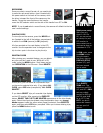
1
8
Video image 4 STEPS FOR AVOIDING OVEREXPOSURE
Determining the
dominant light
source
Before shooting,
determine whether
most of the light in
the scene is com-
ing from the sun or
from articial lights.
For best color re-
sults, try to reduce
the light com-
ing from the less
dominant source.
You can do this by
covering windows (if
your primary light
source is articial)
or by turning off
incandescent and
uorescent lights
and placing your
subject close to
a window (if your
primary light source
is sunlight).
It’s also possible
to match articial
lights to sunlight by
covering the lights
with blue color con-
version gels which
can be found in the
light kits.
Matching the light
using one of these
methods will pro-
vide better color for
your scene.
FIRST THINGS
FIRST
2
Now
you see
me . . .
now
you
don’t!
Setting an appropriate iris
The iris controls the amount of light entering the camera which deter-
mines how bright the image will be (exposure of the image).
To set the iris appropriately, you must monitor the zebra stripes in
the LCD monitor of the camera. Zebra stripes appear on areas of the
image that are overexposed. In those areas, no detail is recorded
because the light is too intense. A picture is properly exposed when
there are no, or very few, zebra striped areas in the image.
There may be times when you want to overexpose an image, if you
are shooting into a strong backlight, for instance, but generally the
rule applies: minimize the zebra stripes.
IMPORTANT: Do not rely on how the image “looks” in the LCD moni-
tor to determine correct exposure because the LCD monitor shows
brightness inaccurately. Always use zebra stripes.
To set the iris:
Push the ZEBRA button until ZE-
BRA2 100% appears in the LCD
monitor.
To use the AUTO IRIS mode:
Set the AUTO MANUAL
switch to AUTO. AUTO IRIS
appears in the LCD monitor.
The camera will adjust the
exposure automatically.
To use the MANUAL IRIS mode:
Set the AUTO MANUAL switch to MANUAL. MANUAL IRIS appears in the LCD
monitor. Rotate the iris dial until the image is properly exposed. Adjust the dial
and set a new exposure every time the shot changes.





